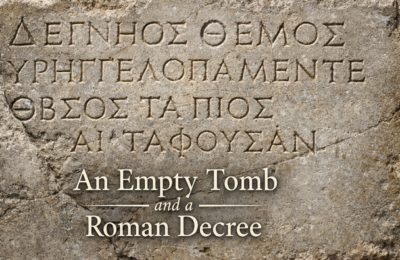Part 1 of 3 of the series Was Jesus who He said He was
Scripture Focus: Luke 1:1–4; 2 Peter 1:16
“We did not follow cleverly devised myths… but we were eyewitnesses of His majesty.”
2 Peter 1:16
Introduction: Not a Myth, but a Man
Step back into the ancient world. Picture dusty roads, Roman soldiers, temple courts bustling with religious tension, and whispers in the streets about a rabbi from Nazareth performing miracles. Some call Him a prophet. Others call Him a threat. But today, some ask: Did He even exist?
This isn’t just academic speculation—it’s the first domino. Because if Jesus never existed, then the gospel collapses, the cross is a fiction, and hope evaporates.
But what if the opposite is true?
A Faith Rooted in Eyewitness History
A. Luke’s Opening Statement: “I Investigated Everything”
Luke begins his Gospel not with mystery, but with method:
“It seemed fitting… having investigated everything carefully from the beginning, to write it out for you in orderly sequence…”
Luke 1:3
This is the language of history, not mythology. Luke presents his Gospel as historia, based on eyewitnesses and firsthand accounts. The goal? Certainty (Luke 1:4). In the same vein, Peter declares:
“We did not follow cleverly devised myths… but we were eyewitnesses of His majesty”
2 Peter 1:16
Unlike Greek myths or Gnostic fables, the New Testament claims historical truth. Jesus entered time and space, not just religious imagination.
B. Paul’s Letters: The Earliest Evidence
Before the Gospels were written, Paul penned letters that historians date between AD 48–65—within two decades of Jesus’ death. These are not theological abstracts; they are pastoral and historical, often referencing key events:
- 1 Corinthians 15:3–8 contains an early creed affirming Jesus’ death, burial, resurrection, and post-resurrection appearances—received and repeated by the church within five years of the crucifixion (Hurtado, 2005, pp. 168–169).
- Galatians 1:18–19 identifies James as “the Lord’s brother,” a biological connection that only makes sense if Jesus lived as a historical person.
No historian disputes the authenticity of Paul’s letters or his knowledge of Jesus’ immediate followers (Ehrman, 2012, p. 123).
Non-Christian Testimonies: Hostile Witnesses Confirm the Man
What about sources outside the Bible? Skeptics often ask whether any non-Christian writers affirmed Jesus’ existence. The answer is yes—repeatedly.
A. Josephus (AD 93)
The Jewish historian Flavius Josephus refers to “Jesus who was called Christ” in Antiquities of the Jews (20.9.1), noting that James was “his brother.” A separate passage—though later modified by Christian scribes—originally affirmed Jesus as a wise teacher crucified by Pilate (Meier, 1991, pp. 60–62).
B. Tacitus (AD 116)
The Roman historian Tacitus, hostile to Christianity, records:
“Christus… suffered the extreme penalty during the reign of Tiberius at the hands of one of our procurators, Pontius Pilate” (Annals15.44; cited in Wilken, 2003, p. 104).
This is a remarkably specific confirmation of the Gospel accounts—coming from a Roman elite with no sympathy for Christian faith.
C. Pliny the Younger and Suetonius
Pliny (c. AD 112) describes early Christians gathering “to sing hymns to Christ as to a god” (Letters 10.96; Wilken, 2003, p. 103). Suetonius (c. AD 120) mentions disturbances in Rome instigated by “Chrestus”—likely a Latinized misspelling of Christos (Life of Claudius 25.4).
D. Babylonian Talmud
The Talmud (Sanhedrin 43a) records that “Yeshu” was hanged on the eve of Passover. While written from a polemical Jewish perspective, this hostile tradition affirms Jesus was executed—consistent with the Gospel chronology.
Exposing the Mythic Theory: Fringe, Not Fact
The idea that Jesus never existed—popularized in internet forums and conspiracy books—is a fringe theory rejected by virtually every credentialed historian, regardless of belief system.
- Bart Ehrman (agnostic): “The view that Jesus existed is held by virtually every expert on the planet” (Ehrman, 2012, p. 4).
- Gerd Lüdemann (atheist): “Jesus’ death as a consequence of crucifixion is indisputable” (Lüdemann, 2000, p. 80).
Historian Michael Grant, no evangelical by any means, writes:
“To suppose that Jesus never existed… is more fantastic than all the miracles recorded in the Gospels” (Grant, 1977, p. 200).
The theory fails not only due to textual evidence but historical plausibility: myths take generations to form, not mere decades. And the church—rooted in a Jewish worldview hostile to invented deities—was built around a crucified man they claimed to have seen risen.
Theological Stakes: The Word Became Flesh
Why does it matter?
Because Christianity doesn’t preach a concept—it proclaims a person. The incarnation isn’t metaphor. The cross isn’t parable. The resurrection isn’t poetry. These events happened in history—or they didn’t happen at all (1 Cor. 15:14).
John anchors the gospel in reality:
“The Word became flesh and dwelt among us, and we saw His glory”
John 1:14
And Peter, speaking to those tempted by fables, says, “We were there. We saw Him. We heard the voice” (2 Peter 1:16–18).
Faith in Jesus is not a leap into the dark but a step into the light of history. Christianity alone is built on verifiable public claims—names, dates, locations, officials. Luke dares you to check the facts (Luke 3:1–2).
Conclusion: The Man Who Divides Time
So did Jesus exist?
The overwhelming answer—biblically, historically, and logically—is yes. He was a Galilean Jew, born in obscurity, crucified in Jerusalem, and remembered by friend and foe alike.
But the real question now is this: Who was He? Was He just a teacher, or was He the Son of God? That’s what we’ll explore in Part 2: Did Jesus Really Claim to Be God?
References
Ehrman, B. D. (2012). Did Jesus Exist? The Historical Argument for Jesus of Nazareth. HarperOne.
Grant, M. (1977). Jesus: An Historian’s Review of the Gospels. Scribner.
Hurtado, L. W. (2005). Lord Jesus Christ: Devotion to Jesus in Earliest Christianity. Eerdmans.
Josephus, F. (c. AD 93). Antiquities of the Jews.
Lüdemann, G. (2000). The Resurrection of Christ: A Historical Inquiry. Prometheus Books.
Meier, J. P. (1991). A Marginal Jew: Rethinking the Historical Jesus, Vol. 1. Doubleday.
Wilken, R. L. (2003). The Christians as the Romans Saw Them. Yale University Press.








